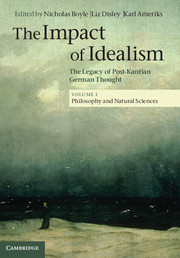Book contents
- Frontmatter
- Contents
- List of Illustrations
- List of Contributors
- Acknowledgements
- List of Abbreviations
- Foreword
- General introduction: the eighteenth and nineteenth centuries
- General introduction: the twentieth and twenty-first centuries
- Introduction: Idealism in the natural sciences and philosophy
- 1 Philosophy of natural science in Idealism and neo-Kantianism
- 2 The impact of German Idealism and Romanticism on biology in the nineteenth century
- 3 The unconscious: transcendental origins, Idealist metaphysics and psychoanalytic metapsychology
- 4 Nietzsche, Kant and teleology
- 5 Transcendental idealism, phenomenology and the metaphysics of intentionality
- 6 Heidegger and the impact of idealism
- 7 French Hegelianism and anti-Hegelianism in the 1960s: Hyppolite, Foucault and Deleuze
- 8 Scottish Idealism
- 9 ‘My station and its duties’: social-role accounts of obligation in Green and Bradley
- 10 Idealism and the origins of analytic philosophy1
- 11 Idealism and Pragmatism: the inheritance of Hegel's concept of experience
- 12 Reason's form
- Bibliography
- Index
- References
10 - Idealism and the origins of analytic philosophy1
Published online by Cambridge University Press: 05 December 2013
- Frontmatter
- Contents
- List of Illustrations
- List of Contributors
- Acknowledgements
- List of Abbreviations
- Foreword
- General introduction: the eighteenth and nineteenth centuries
- General introduction: the twentieth and twenty-first centuries
- Introduction: Idealism in the natural sciences and philosophy
- 1 Philosophy of natural science in Idealism and neo-Kantianism
- 2 The impact of German Idealism and Romanticism on biology in the nineteenth century
- 3 The unconscious: transcendental origins, Idealist metaphysics and psychoanalytic metapsychology
- 4 Nietzsche, Kant and teleology
- 5 Transcendental idealism, phenomenology and the metaphysics of intentionality
- 6 Heidegger and the impact of idealism
- 7 French Hegelianism and anti-Hegelianism in the 1960s: Hyppolite, Foucault and Deleuze
- 8 Scottish Idealism
- 9 ‘My station and its duties’: social-role accounts of obligation in Green and Bradley
- 10 Idealism and the origins of analytic philosophy1
- 11 Idealism and Pragmatism: the inheritance of Hegel's concept of experience
- 12 Reason's form
- Bibliography
- Index
- References
Summary
Analytic philosophy is widely, and with good reason, thought of as having two points of origin. First, in the work of Gottlob Frege: with his systematic presentation of modern logic, his use of that logic to give an account of arithmetic, and his articulation of the philosophical views he takes to be required by his logic; second, in the work of Bertrand Russell and G. E. Moore at the very end of the nineteenth century and the beginning of the twentieth. Russell and Moore put forward a metaphysical view incorporating a strong form of realism and developed their philosophical views on that basis. Russell formulated modern logic and used it to account for mathematics; in both of these matters his view resembles Frege's, but was initially worked out independently; he subsequently sought to apply the same principles to an understanding of empirical knowledge. Moore put forward a strongly realist view of ethics and developed a conception of philosophical analysis.
So we may distinguish the British origins of analytic philosophy from its German origins. Under the former head we shall confine ourselves to discussion of Russell and Moore. Under the latter, however, we shall consider figures other than Frege. Frege's work was confined to logic, the philosophy of mathematics, and to what he took to be the philosophical implications of these subjects. Crucially, he makes no attempt at a systematic treatment of empirical knowledge. Furthermore, his direct influence was quite limited. (Although the philosophers who were directly influenced by him include Russell, Wittgenstein and Carnap.) For these reasons, even the most cursory account of the German origins of analytic philosophy must take some account of later thinkers who played a role in the development of Logical Empiricism (also known as Logical Positivism), especially Carnap, who had the most influence of any of the Logical Empiricists on the subsequent development of analytic philosophy.
- Type
- Chapter
- Information
- The Impact of IdealismThe Legacy of Post-Kantian German Thought, pp. 323 - 346Publisher: Cambridge University PressPrint publication year: 2013
References
- 1
- Cited by



